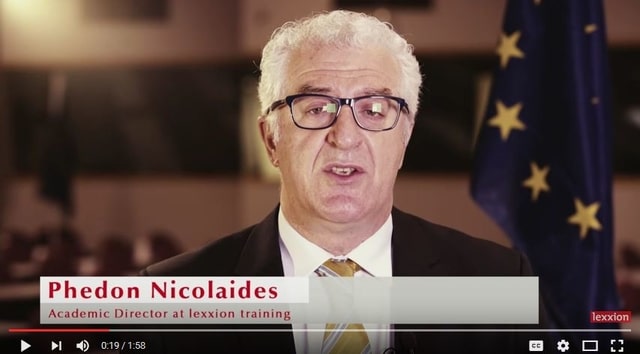When the state imposes obligations which create extra costs for a single undertaking, that undertaking suffers a disadvantage in relation to its competitors. The extra costs are abnormal because normal costs are those borne by all competitors. Introduction On 14 July 2016, the General Court rendered its judgment in case T 143/12, Germany v Commission.1 The outcome was a victory for […]
State Aid Law
Blog
State Aid Uncovered Blog
In Lexxion’s State Aid Uncovered blog, Prof. Phedon Nicolaides publishes weekly critical analyses of recent State aid judgments and decisions. Each post presents the key points of a court judgment or EU Commission decision, places it in the context of similar case law or practice, assesses the underlying reasoning and highlights any inconsistencies or contradictions.
Guest contributions from other State aid experts will also be published on the blog at irregular intervals to complement the content of the blog posts.
State Aid Uncovered ×
6. October 2016 |
State Aid Uncovered
by Phedon Nicolaides
27. September 2016 |
State Aid Uncovered
by Phedon Nicolaides
In the meaning of regional aid rules, diversification in a “new activity” is not the same as diversification in a “new product”. A “new process innovation” must be different, in the sense of being distinct from an existing process, must be substantial, in the sense that it covers the whole production process and must be new, in the sense that […]
20. September 2016 |
State Aid Uncovered
by Phedon Nicolaides
Public assistance to borrowers who cannot repay their loans does not constitute State aid if the beneficiaries are individuals. Public assistance to undertakings which cannot repay their loans does not constitute State aid if the amount of aid does not exceed the de minimis threshold. Any public funding of deposits which are transferred from ailing to healthy banks is not […]
13. September 2016 |
State Aid Uncovered
by Phedon Nicolaides
Creditors must contribute to the recovery of banks before State aid is granted. Burden-sharing by creditors in the recovery of banks does not deprive them of their right to property. Introduction On 19 July 2016, the Court of Justice rendered its judgment in case C‑526/14, Tadej Kotnik and others v Državni zbor Republike Slovenije.[1] The judgment was in response to a […]
6. September 2016 |
State Aid Uncovered
by Phedon Nicolaides
This is the third and last article in a series of three that reviews the Commission’s Notice on the Notion of State Aid.* Last week’s article analysed the concepts of advantage and selectivity. This week the focus is on the last two constituent elements of the notion of State aid: affectation of cross-border trade and distortion of competition. This article […]
30. August 2016 |
State Aid Uncovered
by Phedon Nicolaides
This is the second article in a series of three that reviews the Commission’s Notice on the Notion of State Aid.* Last week’s article focused on the concepts of economic activity and state resources.** Next week’s article will conclude with a presentation of the conditions under which trade is affected and competition distorted and an analysis of the application of […]
23. August 2016 |
State Aid Uncovered
by Phedon Nicolaides
The Notice provides a thorough review of the case law and the decisional practice of the Commission. Introduction After more than two years of deliberations, the Commission Notice on the Notion of State Aid was published in the Official Journal on 19 July 2016.[1] The Notice presents “the Commission’s understanding of Article 107(1) of the Treaty, as interpreted by the […]
16. August 2016 |
State Aid Uncovered
by Phedon Nicolaides
Member States must publish the aid measures they adopt on the basis of the GBER. Failure to publish prevents them from being exempted from notification and renders any aid illegal. Introduction On 21 July 2016, the Court of Justice delivered a judgment in response to a request for a preliminary ruling in case C-493/14, Dilly’s Wellnesshotel v Finanzamt Linz.[1] An […]
4. August 2016 |
State Aid Uncovered
by Lexxion Publisher
What is State aid? Why do I need to be concerned about State aid? These and many more basic questions will be answered in our videos on YouTube. Make sure to visit us! After Phedon Nicolaides has given us examples of “good aid”, today he answers the question “What can I do if my measure contains State aid?”. View the […]
2. August 2016 |
State Aid Uncovered
by Phedon Nicolaides
Tax rulings on transfer pricing have to approximate market-based outcomes. Introduction Twenty years ago, the European Commission initiated discussion on how State aid rules could apply to direct taxation. In 1998 it adopted its Notice on direct business taxation. At about the same time the Commission launched several formal investigations which culminated in negative decisions. In 2013 and 2014, […]
State Aid Uncovered ×
6. October 2016 |
State Aid Uncovered
by Phedon Nicolaides
When the state imposes obligations which create extra costs for a single undertaking, that undertaking suffers a disadvantage in relation to its competitors. The extra costs are abnormal because normal costs are those borne by all competitors. Introduction On 14 July 2016, the General Court rendered its judgment in case T 143/12, Germany v Commission.1 The outcome was a victory for […]
27. September 2016 |
State Aid Uncovered
by Phedon Nicolaides
In the meaning of regional aid rules, diversification in a “new activity” is not the same as diversification in a “new product”. A “new process innovation” must be different, in the sense of being distinct from an existing process, must be substantial, in the sense that it covers the whole production process and must be new, in the sense that […]
20. September 2016 |
State Aid Uncovered
by Phedon Nicolaides
Public assistance to borrowers who cannot repay their loans does not constitute State aid if the beneficiaries are individuals. Public assistance to undertakings which cannot repay their loans does not constitute State aid if the amount of aid does not exceed the de minimis threshold. Any public funding of deposits which are transferred from ailing to healthy banks is not […]
13. September 2016 |
State Aid Uncovered
by Phedon Nicolaides
Creditors must contribute to the recovery of banks before State aid is granted. Burden-sharing by creditors in the recovery of banks does not deprive them of their right to property. Introduction On 19 July 2016, the Court of Justice rendered its judgment in case C‑526/14, Tadej Kotnik and others v Državni zbor Republike Slovenije.[1] The judgment was in response to a […]
6. September 2016 |
State Aid Uncovered
by Phedon Nicolaides
This is the third and last article in a series of three that reviews the Commission’s Notice on the Notion of State Aid.* Last week’s article analysed the concepts of advantage and selectivity. This week the focus is on the last two constituent elements of the notion of State aid: affectation of cross-border trade and distortion of competition. This article […]
30. August 2016 |
State Aid Uncovered
by Phedon Nicolaides
This is the second article in a series of three that reviews the Commission’s Notice on the Notion of State Aid.* Last week’s article focused on the concepts of economic activity and state resources.** Next week’s article will conclude with a presentation of the conditions under which trade is affected and competition distorted and an analysis of the application of […]
23. August 2016 |
State Aid Uncovered
by Phedon Nicolaides
The Notice provides a thorough review of the case law and the decisional practice of the Commission. Introduction After more than two years of deliberations, the Commission Notice on the Notion of State Aid was published in the Official Journal on 19 July 2016.[1] The Notice presents “the Commission’s understanding of Article 107(1) of the Treaty, as interpreted by the […]
16. August 2016 |
State Aid Uncovered
by Phedon Nicolaides
Member States must publish the aid measures they adopt on the basis of the GBER. Failure to publish prevents them from being exempted from notification and renders any aid illegal. Introduction On 21 July 2016, the Court of Justice delivered a judgment in response to a request for a preliminary ruling in case C-493/14, Dilly’s Wellnesshotel v Finanzamt Linz.[1] An […]
4. August 2016 |
State Aid Uncovered
by Lexxion Publisher
What is State aid? Why do I need to be concerned about State aid? These and many more basic questions will be answered in our videos on YouTube. Make sure to visit us! After Phedon Nicolaides has given us examples of “good aid”, today he answers the question “What can I do if my measure contains State aid?”. View the […]
2. August 2016 |
State Aid Uncovered
by Phedon Nicolaides
Tax rulings on transfer pricing have to approximate market-based outcomes. Introduction Twenty years ago, the European Commission initiated discussion on how State aid rules could apply to direct taxation. In 1998 it adopted its Notice on direct business taxation. At about the same time the Commission launched several formal investigations which culminated in negative decisions. In 2013 and 2014, […]
State Aid Uncovered ×
6. October 2016 |
State Aid Uncovered
by Phedon Nicolaides
When the state imposes obligations which create extra costs for a single undertaking, that undertaking suffers a disadvantage in relation to its competitors. The extra costs are abnormal because normal costs are those borne by all competitors. Introduction On 14 July 2016, the General Court rendered its judgment in case T 143/12, Germany v Commission.1 The outcome was a victory for […]
27. September 2016 |
State Aid Uncovered
by Phedon Nicolaides
In the meaning of regional aid rules, diversification in a “new activity” is not the same as diversification in a “new product”. A “new process innovation” must be different, in the sense of being distinct from an existing process, must be substantial, in the sense that it covers the whole production process and must be new, in the sense that […]
20. September 2016 |
State Aid Uncovered
by Phedon Nicolaides
Public assistance to borrowers who cannot repay their loans does not constitute State aid if the beneficiaries are individuals. Public assistance to undertakings which cannot repay their loans does not constitute State aid if the amount of aid does not exceed the de minimis threshold. Any public funding of deposits which are transferred from ailing to healthy banks is not […]
13. September 2016 |
State Aid Uncovered
by Phedon Nicolaides
Creditors must contribute to the recovery of banks before State aid is granted. Burden-sharing by creditors in the recovery of banks does not deprive them of their right to property. Introduction On 19 July 2016, the Court of Justice rendered its judgment in case C‑526/14, Tadej Kotnik and others v Državni zbor Republike Slovenije.[1] The judgment was in response to a […]
6. September 2016 |
State Aid Uncovered
by Phedon Nicolaides
This is the third and last article in a series of three that reviews the Commission’s Notice on the Notion of State Aid.* Last week’s article analysed the concepts of advantage and selectivity. This week the focus is on the last two constituent elements of the notion of State aid: affectation of cross-border trade and distortion of competition. This article […]
30. August 2016 |
State Aid Uncovered
by Phedon Nicolaides
This is the second article in a series of three that reviews the Commission’s Notice on the Notion of State Aid.* Last week’s article focused on the concepts of economic activity and state resources.** Next week’s article will conclude with a presentation of the conditions under which trade is affected and competition distorted and an analysis of the application of […]
23. August 2016 |
State Aid Uncovered
by Phedon Nicolaides
The Notice provides a thorough review of the case law and the decisional practice of the Commission. Introduction After more than two years of deliberations, the Commission Notice on the Notion of State Aid was published in the Official Journal on 19 July 2016.[1] The Notice presents “the Commission’s understanding of Article 107(1) of the Treaty, as interpreted by the […]
16. August 2016 |
State Aid Uncovered
by Phedon Nicolaides
Member States must publish the aid measures they adopt on the basis of the GBER. Failure to publish prevents them from being exempted from notification and renders any aid illegal. Introduction On 21 July 2016, the Court of Justice delivered a judgment in response to a request for a preliminary ruling in case C-493/14, Dilly’s Wellnesshotel v Finanzamt Linz.[1] An […]
4. August 2016 |
State Aid Uncovered
by Lexxion Publisher
What is State aid? Why do I need to be concerned about State aid? These and many more basic questions will be answered in our videos on YouTube. Make sure to visit us! After Phedon Nicolaides has given us examples of “good aid”, today he answers the question “What can I do if my measure contains State aid?”. View the […]
2. August 2016 |
State Aid Uncovered
by Phedon Nicolaides
Tax rulings on transfer pricing have to approximate market-based outcomes. Introduction Twenty years ago, the European Commission initiated discussion on how State aid rules could apply to direct taxation. In 1998 it adopted its Notice on direct business taxation. At about the same time the Commission launched several formal investigations which culminated in negative decisions. In 2013 and 2014, […]











